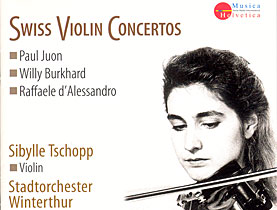Swiss Violin Concertos

Three concertos for violin and orchestra reflect the many influences from neighbouring countries as well as various forms of synthesis between Germanic severity and Latin clarity. Swiss violinist Sibylle Tschopp, along with the Stadtorchester Winterthur under the direction of Nicholas Carthy, performs works of Paul Juon, Willy Burkhard and Raffaele d'Alessandro.
Paul Juon (1872-1940)
Born in Moscow, Paul Juon was the grandson of a confectioner who had emigrated from the Swiss canton of Grisons (Graubünden).
He studied at the Moscow Conservatory with Jan Hrimaly (violon), Anton Arensky and Sergej Taneyev (composition) and from 1894 to 1896 at the “Hochschule für Musik” in Berlin.
Juon, who is often referred to as the “Russian Brahms”, was appointed assistant professor at the “Hochschule für Musik” in Berlin in 1905, assuming a full professorship in 1911. Winner of the Mendelssohn Prize in 1896 and the Beethoven Prize in 1929, he was made a member of the Prussian Academy of the Arts in Berlin in 1919.
He moved to Switzerland in 1934 to dedicate himself completely to composition. His death only six years later in Vevey went virtually unnoticed.
Initially inspired by Tchaikovsky and Brahms, his later works were progressively influenced by music from the Scandinavian countries.
His compositions are distinguished by a melancholy lyricism and a vivacity inspired by Russian folk dances.
Willy Burkhard (1900-1955)
Born in Leubringen, canton Berne, Willy Burkhard completed his training as a schoolteacher before beginning his music studies with Robert Teichmüller (piano) and Sigfried Karg-Elert (composition) at the Leipzig Conservatory in 1921.
After further studies with Walter Courvoisier in Munich and with Max d’Ollone in Paris, Burkhard assumed a teaching position for music theory at the Berne Conservatory in 1928.
From 1942 until his death he taught composition and music theory at the Zurich Conservatory, where his students included Klaus Huber, Rudolf Kelterborn, Armin Schibler and Ernst Widmer.
Willy Burkhard played an important role in the renewal of Protestant sacred music, earning renown for his oratorio “Das Gesicht Jesajas”.
Raffaele d’Alessandro (1911-1959)
The son of a Swiss mother from canton Grisons (Graubünden) and an Italian immigrant, Raffaele d’Alessandro studied with Paul Müller in Zurich and with Nadia Boulanger in Paris, where he was introduced to the sonorous universe of Maurice Ravel and the anti-romantic works of the avant-garde group of composers known as “Les Six”.
After further studies with Marcel Dupré (organ) he returned to Switzerland, settling in Lausanne in 1940.
Dinu Lipatti admired the versatile composer, saying of him: “I consider Raffaele d’Alessandro to be one of the most complete musicians of our generation.”
D’Alessandro’s violin concerto, composed in Lausanne in 1941, had to wait until 1997 for receiving its first performance in Winterthur. Sybille Tschopp perfomed the solo part and was accompanied by the Stadtorchester Winterthur under the direction of Nicholas Carthy.
Sibylle Tschopp
Born in Zurich in 1971, Sibylle Tschopp has earned an international reputation both as a soloist and as a chamber musician.
At the age of 18 she performed at the Lucerne International Music Festival and at the Zurich Tonhalle, as well at the Grosse Musikhalle in Hamburg and the Wigmore Hall in London.
Sibylle Tschopp received artistic and technical inspiration from Prof. Aïda Stucki (Academy of Music Winterthur/Zurich) and Prof. Franco Gulli (Indiana University, Bloomington, USA), as well as from Herbert Scherz (Lucerne Music Conservatory).
Perfomance diploma in 1990, concert diploma in 1992, soloist’s diploma in 1993, all with honours. Studies in master classes with Yehudi Menuhin, Pierre Amoyal, Rudolf Baumgartner, the Smetana Quartet and others.
Concert reviews, recordings, radio and television appearances in Switzerland and abroad testfy to her manifold and successful concert activities.
The Stadtorchester Winterthur
The Stadtorchester Winterthur was founded in 1875 thanks to the support of the “Musikkollegium Winterthur”, a private association of music enthusiasts which has existed in Winterthur since the early 17th century.
Under the direction of Hermann Scherchen during the 1920’s the ensemble was expanded to a full-time professional orchestra.
The Stadtorchester Winterthur, one of Switzerland’s leading symphonic ensembles, performs some 50 to 60 concerts a year.
Nicholas Carthy
Born in Bedford, England. Piano and viola studies in London. Completed studies in conducting in 1987.
In 1993 Nicholas Carthy was named the principal conductor of the Orchestra della Svizera Italiana, a position which he held until 1996.
1998 he takes over as Musical Director of the Ystad Opera in Sweden.
Production information
Swiss Violin concertos. Sibylle Tschopp, violin (1998). Musica Helvetica MH CD 114.2. Executive producer for SRI: Christian Strickler

You can find an overview of ongoing debates with our journalists here. Please join us!
If you want to start a conversation about a topic raised in this article or want to report factual errors, email us at english@swissinfo.ch.